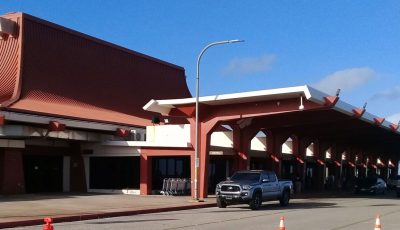Tinian mayor laments delay in draft MOU for a ship recycling facility
Dela Cruz said the draft MOU should have been released to the CPA board of directors for action by now.
“I had hoped that this MOU would have already been accomplished, as we agreed at our joint meeting in the Senate session hall two weeks ago,” Dela Cruz told Fitial in a two-page letter.
The Fitial administration has yet to respond to media request for comment on the draft MOU which, according to Dela Cruz, has not been released yet by assistant attorney general Jim Stump. Fitial is leaving for Virginia this week to attend the National Governors Association meeting.
Fitial earlier said he supports the ship recycling project on Tinian.
Dela Cruz said that Tinian has agreed to work with the U.S. Interior’s Office of Insular Affairs to reprogram over $3 million of its precious capital improvement project funds to make the necessary repairs to the Tinian harbor. The repairs would make the dock space functional for the ship recycling project.
“CPA’s only investment is the cost of the contract with FIC to bring the project to fruition,” Dela Cruz added.
The Tinian mayor said that Keith Aughenbaugh, CIP fund coordinator at OIA, confirmed that federal CIP funds can be used for this purpose.
“I see no reason why the project should be delayed and every reason why CPA should be pushing forward with it aggressively,” the mayor said, adding that the project would mean more to the CNMI than it does to Tinian.
OIA Director Nikolau Pula told the media during that meeting with Fitial, CPA, and Tinian leaders that OIA is open to assisting the CNMI by way of allowing the redirection of CIP funds to help repair the Tinian pier which, in turn, would help support a proposed multimillion Tinian ship recycling facility.
Initially, most of the funds generated by the ship recycling operation will go to the general fund or to CPA, including all business gross revenue taxes, excise taxes on containers full of scrap metal headed to China, and lease fees paid to CPA for the use of the dock and adjacent lands that CPA owns.
Dela Cruz said this means more than just creating 300 new private sector jobs in the recycling business as it will also create a new opportunity to create an industry that will export products from the CNMI-the first since the demise of the garment industry.
The Tinian mayor enumerated other benefits of having a ship recycling operation on Tinian.
Because the ship recycling company will be using its own ship to carry containers full of scrap metal to China, it can bring back containers filled with inexpensive pig food for new piggeries, and barbed wire and fence posts to expand cattle herds, Dela Cruz said.
He said a company on Saipan is developing a slaughterhouse. Tinian is also preparing a design for a U.S. Department of Agriculture-approved “kill station.” This will allow local meat wholesalers and retailers to re-cut locally grown beef and pigs for resale, creating more private sector jobs for people and an import substitution product for local consumption or export.
Dela Cruz said that with the Tinian harbor fully operational, Tinian will be able to justify the need to receive additional CIP funding to repair the breakwater, thus making Tinian more attractive to military development.
“Finally, the ship recycling industry will generate the funds necessary for CPA to complete the Tinian West Field ‘International’ Airport. We are confident that if it becomes fully functional, then international air carriers will schedule direct flights to Tinian. This then will provide stimulus for those companies that have already applied for a casino license to begin construction on their hotel casino complex. We still believe that with your support, the Tinian hotel and casino industry can provide all the revenues the CNMI needs to make it financially viable once again,” the mayor added.
Dela Cruz also reminded the governor of the commitment he made to the ship recycling project at their joint meeting with CPA, the Tinian Legislative Delegation, and OIA two weeks ago. He urged the governor to call a special meeting of the CPA board of directors and encourage them to approve the MOU with FIC.
The proposed facility will turn decommissioned U.S. ships into scrap metal and sell them in the open market. The planned project is neither a repair facility nor a shipyard. The vessels will be “scrubbed” to U.S. Environmental Protection Agency standards.



























